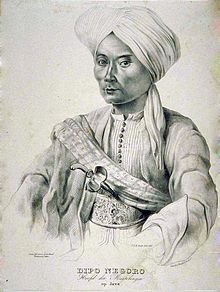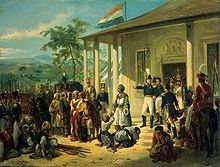- Diponegoro
-
Diponegoro 
Portrait of Prince Diponegoro, 1835 Spouse Kedhaton
Ratnaningsih
RatnaningrumIssue 17 sons and 5 daughters Full name Mustahar House Hamengkubuwana Father Hamengkubuwana III Mother Mangkarawati Born 11 November 1785
Yogyakarta SultanateDied 8 January 1855 (aged 69)
Makassar, Dutch East IndiesBurial Makassar, Dutch East Indies Diponegoro (Mustahar; Antawirya; 11 November 1785 – 8 January 1855),[1] also known as Dipanegara, was a Javanese prince who opposed the Dutch colonial rule. He played an important role in the Java War (1825–1830). In 1830, the Dutch exiled him to Makassar.
Contents
Early life
Diponegoro was born on 11 November 1785 in Yogyakarta, and was the eldest son of Sultan Hamengkubuwono III of Yogyakarta. When the sultan died in 1814, Diponegoro was passed over for the succession to the throne in favor of his younger half brother who was supported by the Dutch. Being a devout Muslim, Diponegoro was alarmed by the relaxing of religious observance at his half brother's court, as well as by the court's pro-Dutch policy.
In 1821, famine and plague spread in Java. His half brother Hamengkubuwono IV (r. 1814-1821) who had succeeded their father died. He left only an infant son as heir, Hamengkubuwono V. When the year-old was appointed as new sultan, there was a dispute over his guardianship. Diponegoro was again passed over, though he believed he had been promised the right to succeed his half brother.[2] This series of natural disaster and political upheaval finally erupted into full scale rebellion.[3]
Rebellion against the Dutch
Dutch colonial rule was becoming unpopular by the local farmers because of tax rises, crop failures and by Javanese nobles because the Dutch colonial authorities deprived them of their right to lease land. Because the local farmers and many nobles were ready to support Diponegoro and because he believed that he had been chosen by divine powers to lead a rebellion against the Christian colonials, he started a holy war against the Dutch. Dipenogoro was widely believed to be the Ratu Adil, the Just Ruler predicted in the Pralembang Joyoboyo.[citation needed]
The beginning of the war saw large losses on the side of the Dutch, due to their lack of coherent strategy and commitment in fighting Diponegoro's guerrilla warfare. Ambushes were set up, and food supplies were denied to the Dutch troops. The Dutch finally committed themselves to controlling the spreading rebellion by increasing the number of troops and sending General De Kock to stop the insurgencies. De Kock developed a strategy of fortified camps (benteng) and mobile forces. Heavily-fortified and well-defended soldiers occupied key landmarks to limit the movement of Diponegoro's troops while mobile forces tried to find and fight the rebels. From 1829, Diponegoro definitely lost the initiative and he was put in a defensive position. Many troops and leaders were defeated or deserted.
Defeat and exile
In 1830 Diponegoro's military was as good as beaten and negotiations were started. Diponegoro demanded to have a free state under a sultan and he wanted to become the Muslim leader (kalief) for the whole of Java. In March 1830 he was invited to negotiate under a flag of truce. He accepted but was taken prisoner on 28 March despite the flag of truce. De Kock claims that he had warned several Javanese nobles to tell Diponegoro he had to lessen his previous demands or that he would be forced to take other measures.[4] The Dutch exiled him to Makassar.
Legacy
Today Diponegoro is a National Hero of Indonesia, and Kodam IV/Diponegoro, the Central Java Military Region, is named after him.
References
- ^ http://www.yogyes.com/en/yogyakarta-tourism-object/museum-and-monument/sasana-wiratama/
- ^ "Diponegoro - MSN Encarta". Archived from the original on 2009-10-31. http://www.webcitation.org/5kwbOFGYo.
- ^ Ricklefs, Merle Calvin (1993). A history of modern Indonesia since c. 1300. Stanford University Press. pp. 115. ISBN 0804721947, 9780804721943. http://books.google.com.my/books?id=ukurAAAAIAA.
- ^ http://iclweb01.fsw.leidenuniv.nl/walhain/eindexamen/Level_4/cse/Indonesie/schoolboeken/Diponegoro/diponego.htm#oorzaken
Further reading
- Carey, P.B.R. Babad Dipanagara : an account of the outbreak of the Java War (1825-30) : the Surakarta court version of the Babad Dipanagara Kuala Lumpur: Printed for the Council of the M.B.R.A.S. by Art Printing Works, 1981. Monograph (Royal Asiatic Society of Great Britain and Ireland. Malaysian Branch); no.9.
- Sagimun M. D. Pangeran Dipanegara : pahlawan nasional Jakarta: Proyek Biografi Pahlawan Nasional, Departemen Pendidikan dan Kebudayaan, 1976. (Indonesian language)
- Yamin, M. Sedjarah peperangan Dipanegara : pahlawan kemerdekaan Indonesia Jakarta : Pembangunan, 1950. (Indonesian language)
External links
- http://home.iae.nl/users/arcengel/NedIndie/diponegoroengels.htm A Dutch web page on Diponegoro
- http://www.yogyes.com/en/yogyakarta-tourism-object/museum-and-monument/sasana-wiratama/ The web page of the museum based at his home
1. http://encarta.msn.com/encyclopedia_761584175/diponegoro.html
2. http://iclweb01.fsw.leidenuniv.nl/walhain/eindexamen/Level_4/cse/Indonesie/schoolboeken/Diponegoro/diponego.htm#oorzaken3. http://www.raden-saleh.org The web site of the Prince Raden Saleh Foundation. See the page "Capture of Prince Diponegoro"
Categories:- 1785 births
- 1855 deaths
- Javanese people
- History of Java
- Rebels
- National Heroes of Indonesia
- Dutch East Indies
- People from Yogyakarta
Wikimedia Foundation. 2010.

